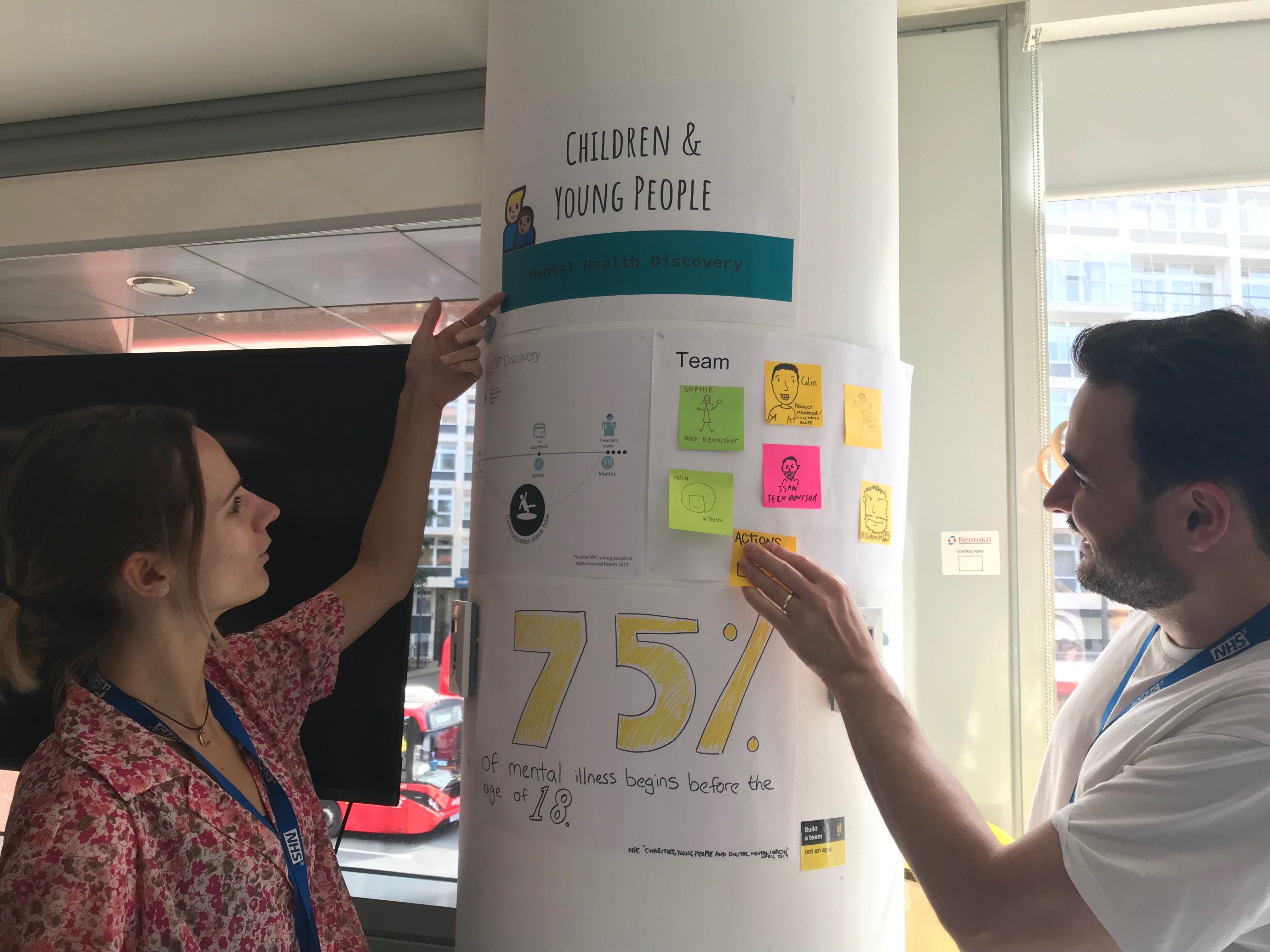NHSX and Mental Health Update 7
This is an informal update to NHSX’s commitment to:
Digital and data specialists from NHSX will team up with NHS England’s mental health national policy teams to help clinicians and policymakers improve patient experience through technology.
This is a selection of things that happened (other things also happened) from team members working on a discovery into children, young people and mental health…
We wrote a blog post

Reading
More reading. Much more to do.
Shout out this week to Anna Freud Centre - What works for me report. They found the 6 most commonly chosen approaches to self-care which included:
- Listening to music
- Reading or watching TV
- Talking to someone you know and trust
- Going outside
- Laughter
- Crying
These were sources from children, young people, parents or carers. Also lead to the creation of this repository of self-care methods. The links come with quotes from young people too.
Dos and don’ts in describing Mental Health
We’re keen to make sure we’re using suitable language when discussing mental health, both internally among the team and when sending external comms.
A colleague in DHSC mental health has signposted us to helpful advice from Time to Change, Samaritans and the BBC, and we’ve taken the time to read and learn from this guidance.
Using CYPMHS
When colleagues in NHS England were working on Future in Mind in 2015, young people told them that they didn’t like ‘CAMHS’ as a brand and preferred ‘Children and Young People’s Mental Health Services’ (CYPMHS).
A colleague highlighted this to us and we’re going to try, wherever possible, to use CYPMHS in blog posts, these updates and other comms. We may still need to use CAMHS, for example when recruiting for user research, as it remains a widely recognised term.
Facebook visit
A couple of the team were invited with a number of other cross-Government colleagues to go visit Facebook and hear about their work around well-being.
Thanks @facebook for inviting our Mental Health team @NHSX to meet the lead researcher working on wellbeing 👩💻 #design #ux #cypmhs pic.twitter.com/R6rM8xwuHE
— Sophie Rankin (@SophieAnnRankin) August 20, 2019
Reflections from the team:
- a number of initiatives to prevent harm to users
- tools to give users more agency and control
- we suggested they add to design patterns for mental health
Demonstrating progress
We had our first show and tell with the children and young people team.
We agreed at our inception day to piggyback on existing team meetings so secured an early slot and barreled through what’s been happening so far. We had a question or two and they very kindly helped to connect us to people that will help future research.
Update on existing services
We have identified a substantial number of existing digital tools. Primarily apps for self-management of mental health and wellbeing, the second largest category was peer support . While some of the apps we identified are supported by scientific research this isn’t true of all apps on the market.
Having established a sense of the existing market place we have invested some time into horizon scanning, this is to ensure that any recommendations we make are informed by emerging technology in the mental health space, initial research has shown that substantial investment is going into Virtual and Augmented Reality tools to support users to practice real life scenarios in a safe environment.
Retrospective
We held our first retrospective at the end of sprint 1.
Some actions: we agreed to review the stakeholder map and make sure we spend one day a week sat with the NHSE mental health policy team in Skipton House.
Planning
As the first sprint came to an end we got back together to plan for sprint 2. Priorities for this sprint:
- Conduct first round of user research
- Preparing for future rounds of research
- Continue reading existing research and reviewing existing services
Finding participants
.jpg) This week we reached out via charity networks for parents to take part in Round 2 research: home visits and interviews.
This week we reached out via charity networks for parents to take part in Round 2 research: home visits and interviews.
We’ve had a good response so far. Information sheets and screening questions have been shared with participants who expressed an interest. This is to make sure they meet the criteria to take part and we include representative demographics and experiences.
Our researcher has had initial phone calls with parents who passed the screener to make sure they are comfortable with what’s involved and give them the opportunity to ask questions. It’s been a challenge hearing about some of their experiences - even just at a high level. This has highlighted to us the importance of making sure plans are in place to protect participants (and the team) during the research, as well as having appropriate channels of support and signposting.
At the end of this week, we received the list of regional leads for CYPMHS across England and have contacted them to get involved.
It’s been a lot trickier than we expected to arrange site visits to CYPMHS, as many people are away on holiday. This means we are a little bit behind at the moment but hopefully we can make this time up later in the discovery. We’re still looking for CYPMHS staff and services to visit, please get in touch at digitalresearch@nhsx.nhs.uk if you can help.
Thank you to everyone who has helped so far.
Find out more
If you want to stay informed about wider NHSX work then check out @NHSX on Twitter.
If you want to give us feedback or get in touch with the team then you can do so using this form!